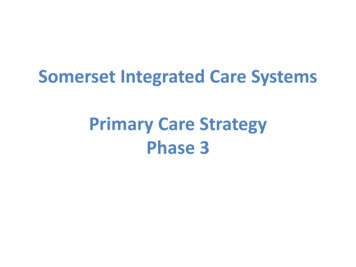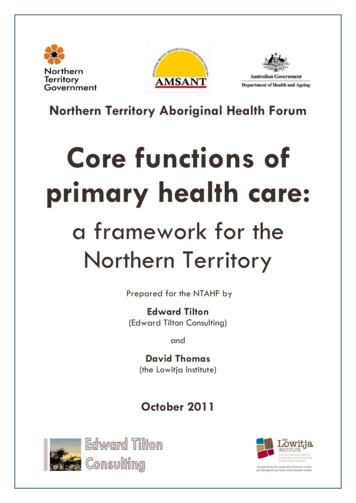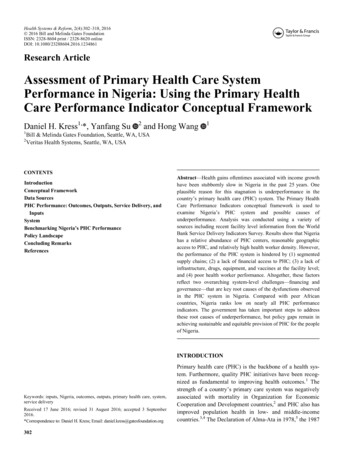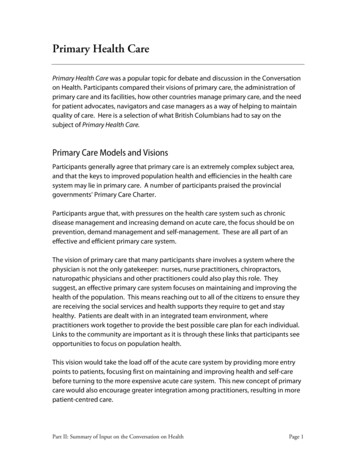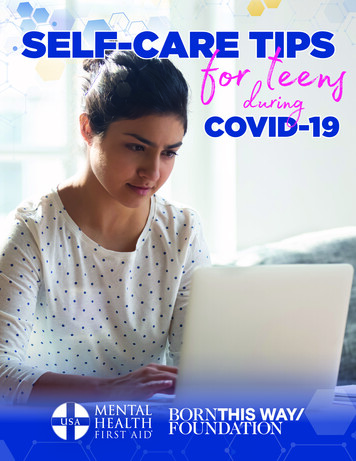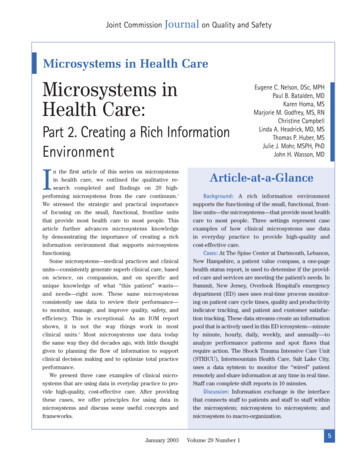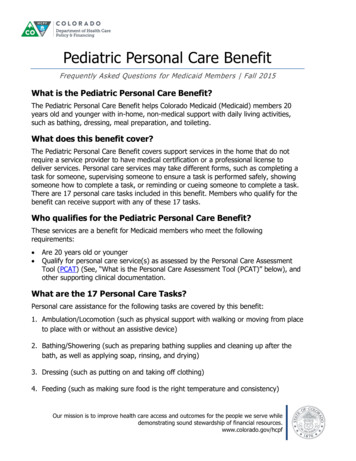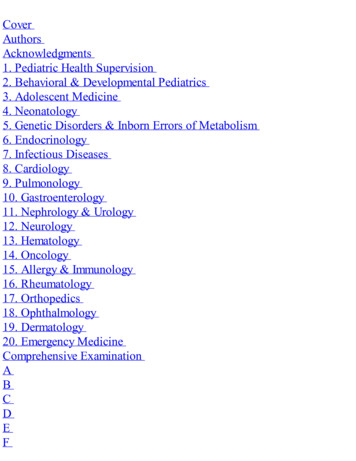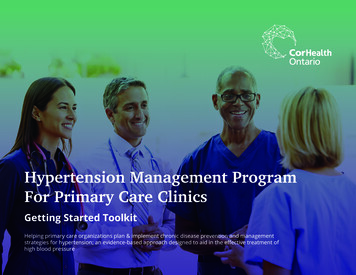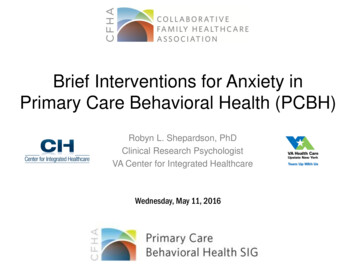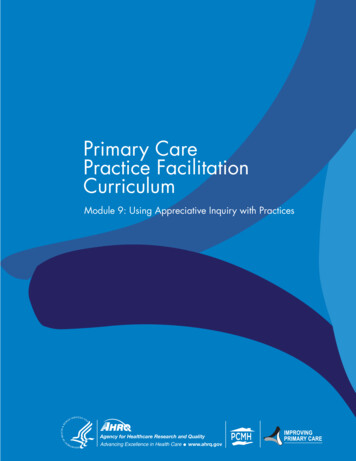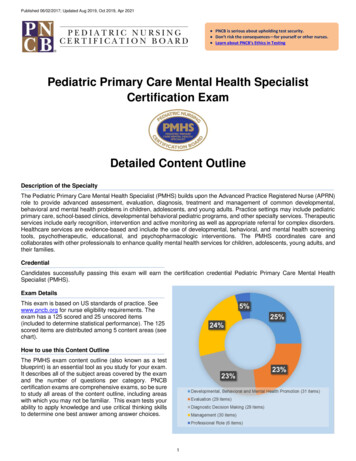
Transcription
Published 06/02/2017; Updated Aug 2019, Oct 2019, Apr 2021 PNCB is serious about upholding test security. Don’t risk the consequences—for yourself or other nurses. Learn about PNCB’s Ethics in TestingPediatric Primary Care Mental Health SpecialistCertification ExamDetailed Content OutlineDescription of the SpecialtyThe Pediatric Primary Care Mental Health Specialist (PMHS) builds upon the Advanced Practice Registered Nurse (APRN)role to provide advanced assessment, evaluation, diagnosis, treatment and management of common developmental,behavioral and mental health problems in children, adolescents, and young adults. Practice settings may include pediatricprimary care, school-based clinics, developmental behavioral pediatric programs, and other specialty services. Therapeuticservices include early recognition, intervention and active monitoring as well as appropriate referral for complex disorders.Healthcare services are evidence-based and include the use of developmental, behavioral, and mental health screeningtools, psychotherapeutic, educational, and psychopharmacologic interventions. The PMHS coordinates care andcollaborates with other professionals to enhance quality mental health services for children, adolescents, young adults, andtheir families.CredentialCandidates successfully passing this exam will earn the certification credential Pediatric Primary Care Mental HealthSpecialist (PMHS).Exam DetailsThis exam is based on US standards of practice. Seewww.pncb.org for nurse eligibility requirements. Theexam has a 125 scored and 25 unscored items(included to determine statistical performance). The 125scored items are distributed among 5 content areas (seechart).How to use this Content OutlineThe PMHS exam content outline (also known as a testblueprint) is an essential tool as you study for your exam.It describes all of the subject areas covered by the examand the number of questions per category. PNCBcertification exams are comprehensive exams, so be sureto study all areas of the content outline, including areaswith which you may not be familiar. This exam tests yourability to apply knowledge and use critical thinking skillsto determine one best answer among answer choices.1
Published 06/02/2017; Updated Aug 2019, Oct 2019, Apr 2021PMHS CONTENT OUTLINEI.TotalDevelopmental, Behavioral and Mental Health Promotion25%(31 items)A. Health Promotion and Anticipatory Guidance1. Promote positive parenting and attachment2. Provide education on lifestyle modification and risk reduction3. Promote social, emotional, and academic functioning4. Provide guidance regarding the impact of individual temperament on development and behavior5. Provide guidance regarding resiliency and healthy coping6. Promote optimal developmental progression7. Provide education about the connection between physical, spiritual, environmental, and psychologicaldeterminants of healthB. Developmental, Behavioral and Mental Health Screening1. Use and interpret evidence-based universal screening tools2. Use and interpret evidence-based screening tools for populations at high risk3. Provide surveillance for risks associated ullying and victimizationenvironmental factorsfamily systemsdelayed developmental milestonesbehavioral and emotional disorders(29 items)Obtain a comprehensive developmental, behavioral and health historyObtain a comprehensive multigenerational family historyReview information/data and/or complete an assessment of academic performance and social competenceAdminister evidence-based developmental, behavioral and mental health assessment toolsSeek information and corroboration from a variety of resourcesPerform physical examination and evaluate behaviorOrder relevant diagnostic and laboratory tests23%Diagnostic Decision Making(29 items)A. Interpret assessment and diagnostic findingsB. Synthesize the data to determine differential diagnosesC. Recognize and differentiate the impact of:1. typical pediatric developmental stages vs. developmental or behavioral disorders2. genetic influences and syndromes3. psychosocial stressors4. medical, behavioral and/or psychiatric co-morbiditiesD. When developing a list of differential diagnoses, consider:1. psychiatric, neurologic and/or behavioral manifestations of medical disorders2. typical vs. atypical presentation of psychiatric disorders3. early signs and symptoms of complex developmental, behavioral, and psychiatric disordersE. Use DSM criteria and taxonomy in diagnostic decision makingF. Engage child/adolescent and family in discussions regarding diagnostic impressionG. Initiate referral and/or consultation in the diagnosis of behavioral, mental health and psychiatric problems asneeded2
Published 06/02/2017; Updated Aug 2019, Oct 2019, Apr 2021PMHS CONTENT OUTLINEIV.Total23%Management(30 items)A. Initial Management1. Incorporate psychoeducation in the discussion of:a)b)c)d)e)f)2.3.4.Establish treatment goals and objectives through collaborative problem solving with the child/adolescent,family, and other team membersObtain and document informed consent and assent for treatmentProvide counseling to introduce evidence-based practices, including:a)b)c)d)e)5.behavioral and cognitive strategiessymptom self-monitoringcoping skillsparenting techniquesenvironmental accommodations and adaptationsProvide evidence-based management of developmental, behavioral, and mental health problems through:a)b)6.7.8.9.10.11.etiologydiagnosis and treatment optionsindications, benefits and risks of pharmacological therapiesindications, benefits and risks of nonpharmacological therapiesbenefits and risks of complementary and alternative therapiesappropriate safety and crisis management planningpharmacological therapiesnonpharmacological therapiesInitiate treatment while awaiting mental health services at a higher level of careInitiate referrals to specialty providers of serviceInitiate referrals to public and community resourcesCollaborate with schools in the provision of care to optimize functionRefer patients with complex psychiatric disorders to appropriate provider(s)Consult and collaborate with multidisciplinary team regarding treatment and managementB. Ongoing Management1. Provide active support, monitoring, and counseling to maximize functioning by:a)b)c)d)e)f)g)2.3.4.5.6.7.8.V.identifying environmental stressorsassessing for high risk behaviorsenhancing family interactionspromoting social and academic functioningencouraging self-monitoringdecreasing the risk of complications related to medicationsenhancing adherence with treatment planEvaluate treatment outcomes related to pharmacological interventionsEvaluate treatment outcomes related to nonpharmacological interventionsIdentify and manage new diagnoses and/or comorbiditiesFacilitate interprofessional communication, collaboration and care coordinationAdvocate for the child and familySupport transition of servicesConclude services appropriately5%Professional Role(6 items)A. Incorporate knowledge of diversity and culture in the provision of careB. Maintain confidentiality and privacy according to current regulations and policiesC. Maintain current knowledge of the following related to developmental, behavioral, and mental health care:1. Federal and state laws2. Ethical considerations3. Practice standards and guidelines4. Quality indicatorsD. Promote models of integrated care and innovative methods of healthcare deliveryE. Demonstrate accuracy in documentation to assure quality of care and support appropriate reimbursement3
Published 06/02/2017; Updated Aug 2019, Oct 2019, Apr 2021Exam Content:DIAGNOSESItems which address specific neurodevelopmental, mental health, and regulatory disorders will be represented within theexam, by volume, according to the following prioritized listing:Diagnosis1ADHD2Anxiety Disorders3Learning Disorders4Depressive Disorders - Mild5Behavioral Sleep Disorders6Disruptive, Impulse-control, and Conduct Disorders7Developmental Delay8Depressive Disorders - Moderate9Communication Disorders10Autism Spectrum Disorders11Trauma- and Stressor-related Disorders (e.g., PTSD, reactive attachment disorders)12Intellectual Disability13Mental and Developmental Disorders Related to Medical Conditions (e.g.,TBI, concussion, obesity, diabetes)14Abuse and Neglect15Somatic Symptoms and Related Disorders16Feeding and Eating Disorders17Elimination Disorders (encopresis and enuresis)18Bipolar and Related Disorders19Neurosensory Impairments20Depressive Disorders - Severe21Obsessive-compulsive and Related Disorders22Substance Use and Addictive Disorders23Motor Disorders24Seizure Disorders25Genetic Disorders26Other Neurodevelopmental Disorders (e.g., cerebral palsy, spina bifida)27Tic Disorders28Breathing-related Sleep Disorders29Gender Dysphoria30Medication Induced Movement DisordersNeurodevelopmental DisorderMental Health DisorderRegulatory Disorder4
Published 06/02/2017; Updated Aug 2019, Oct 2019, Apr 2021Exam Content:PHARMACOLOGIC AND NON-PHARMACOLOGIC MANAGEMENTExam content will include a focus on the following pharmacologic agents (listed in ‘most prescribed’ order) and nonpharmacologic interventions (listed in ‘most performed’ order):Pharmacologic AgentsNon-pharmacologic Interventions1ADHD Medication – Stimulant1Motivational interviewing2ADHD Medication – Non-stimulant2Diet and nutritional approaches3Antidepressant Medications3Collaborative problem solving4Anti-anxiety Medications4Behavioral interventions5Sleep Medications5Educational support services6Over-the-counter Medications6Cognitive behavioral techniques7Supplements (non-prescription)8Mood Stabilizers9Antipsychotic Medications (e.g. for children with autism and aggression)10Antiepileptic Medications (e.g. for mood modulation)Exam Content:SCREENING AND ASSESSMENT TOOLSExam content will include, but not be limited to, a focus on the following Screening and Assessment Tools (listed in ‘mostadministered’ order):Screening and Assessment Tools1Vanderbilt Assessment Scales2Modified Checklist for Autism in Toddlers - Revised (M-CHAT-R)3Patient Health Questionnaire (PHQ, PHQ-9, PHQ-Brief, PHQ-SADS)4Ages & Stages Questionnaire (ASQ)5Home environment, Education and employment, Eating, peer-related Activities, Drugs, Sexuality,Suicide/depression, and Safety from injury and violence6CRAFFT Alcohol and Substance Screening Tool7Pediatric Symptom Checklist (PSC)8Conners Scales for ADHD9Screen for Child Anxiety Related Emotional Disorders (SCARED)10Ages & Stages Questionnaire: Social-Emotional (ASQ-SE)11Child Behavior Checklist (CBCL)12Conners Comprehensive Behavior Rating Scales5
Published 06/02/2017; Updated Aug 2019, Oct 2019, Apr 2021As an exam candidate, you agree not to share informationabout test questions and answers in any way.Learn about PNCB’s Ethics in TestingBelow are examples of acceptable and prohibited (unethical) discussions/behaviors. Because PNCB offers multiple certificationexam types (CPN, CPNP-AC, CPNP-PC, PMHS), the content topic areas below may not represent your exam.AcceptableUnethical“Make sure you brush up on growth and development since youwork in a hospital now.”“Make sure you remember when a baby starts pointing atobjects.”“Expect a lot of respiratory content. It’s the number 1 clinicalproblem on the exam content outline.”“What kinds of respiratory issues were on your exam?”“Renal issues are a clinical problem listed on the contentoutline. Be prepared for those since we don’t see that on ourunit.”“I had a question about acute renal failure, potassium levels,and arrhythmias. Make sure you look that up.”“I forgot skin, wounds, and/or burns would be on the exam.”“I didn’t expect a burn question asking about fluid replacement.I think the right answer had to do with capillary refill.”If in doubt, don’t discuss.Discussing exam questions can lead to serious consequences such as: Prohibiting future exam attempts for the people involvedStopping an in-progress examSuspending an exam for all testersDelaying release of score results beyond advertised timeframeInvalidating exam scoresSuspending or revoke certificationTaking legal action against individualsLearn more from PNCB’s Ethics in Testing: A Personal Responsibility Toolkit.6
collaborates with other professionals to enhance quality mental health services for children, adolescents, young adults, and their families. Credential Candidates successfully passing this exam will earn the certification credential Pediatric Primary Care Mental Health Specialist (PMHS). Exa
